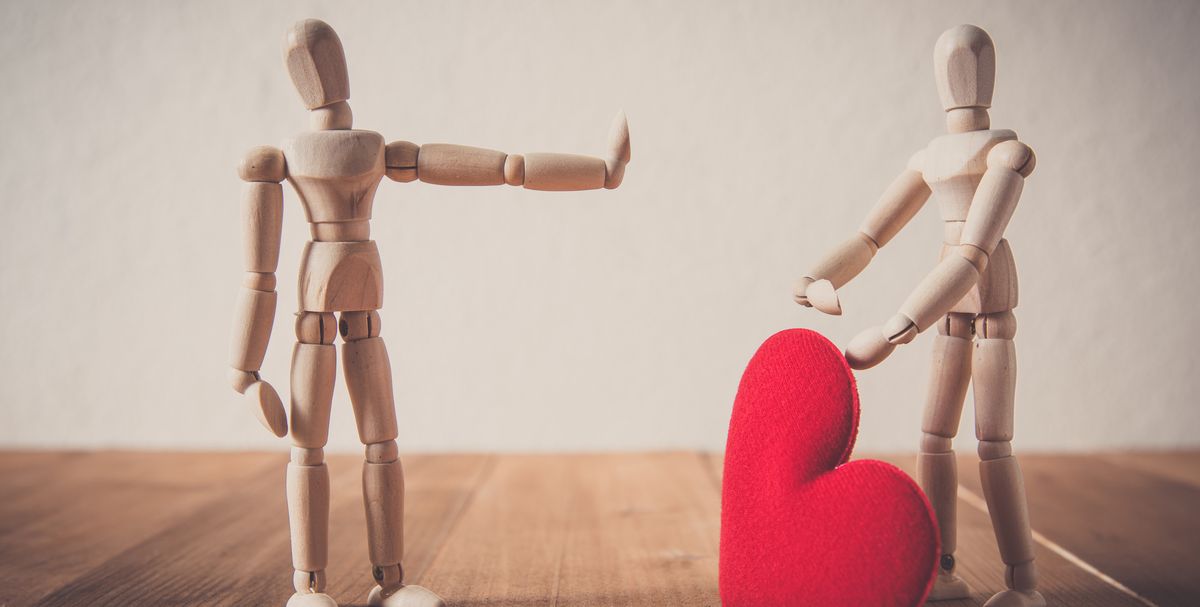It’s painful to be rejected. We’ve all felt the agony of rejection—whether it was a job rejection, a friend’s ghosting, or not getting asked to a social event—and then seeing our pals write about it on social media. This post will help you deal with all of these scenarios including- or maybe particularly- rejection in relationships and friendships. However, let’s begin with the basics…
What Exactly is Rejection?
Rejection is basically defined by scenarios where we are either not included, accepted, or approved of. It also entails the loss of something we had or desired. And, like abandonment, rejection makes us feel unwanted and inadequate.
Did you face any of these frequent rejections as a youngster or a teenager?
- Being a victim of bullying
- Tried out for a team or a school play but didn’t make the cut,
- Having no one to sit with at lunch
- Not being invited to the prom or a party
- Not being accepted into the college of your choice
- Having a lover that cheats on you or leaves you
Unfortunately, some children face rejection at home as well. This adds to the discomfort. You may have been rejected by your parents or relatives for a variety of reasons, including:
- Being chastised, told you’re not good enough or called names that are derogatory
- Being mistreated, neglected, or abandoned is a terrible thing to go through.
- Adoption placement (even when it is done with love) might feel like rejection.
- Being overlooked
- Being told that your feelings, ideas, or views are incorrect or irrelevant
- Your parents preferring your younger sibling
- Being sent away because you were “troubled” or “difficult”
- Being told you’re untalented and should abandon your ambitions and dreams
- Disapproval or lack of acceptance for your sexual orientation or gender identity
False Beliefs Are Formed as a Result of Rejection
The more often you are rejected, and the younger you were when you were rejected, the more significant it is.
Young children are especially vulnerable since their self-concept and self-worth are still forming. Even if no one explicitly told you that you were insufficient or unlovable, you may have assumed so when you were rejected since young children lack the thinking skills and life experiences to fully comprehend all of the various causes for rejection.
When you’re a kid and you’re continually rejected, it’s easy to believe you’re not good enough. And these incorrect assumptions might exacerbate the pain of rejection by acting as a self-fulfilling prophecy.
Rejection Causes Emotional Barriers to be Built
We naturally wish to shield ourselves from future rejection since rejection is so unpleasant. We accomplish this by erecting emotional barriers or refusing to share vulnerable information, such as things about which we are anxious or self-conscious, as well as our difficulties, goals, and dreams. Then we unconsciously believe that keeping people at a distance will prevent us from becoming attached or falling in love, or that rejection would be less painful if the other person doesn’t know us well enough.
Another thing that happens is that we begin to expect rejection. And because we believe that rejection is unavoidable, we take the initiative and reject the other person before they get the opportunity to reject us. We believe that by doing so, we will avoid the grief of losing someone we care about or who we wanted to learn more about. Rejecting people may give us a false sense of control and power, but it doesn’t make the loss any less painful.
Putting up emotional barriers and hastily rejecting others does not help us build happy relationships or protect us from rejection pain.
How to Deal With Rejection From a Crush, Job, Friends or Family
The fact that it could be difficult to deal with rejection doesn’t entirely rule out the fact that it isn’t possible to deal with it. Here are practical tips to follow;
#1. Accept the Grief and Mourn the Loss
When we’re rejected, we often feel ashamed or embarrassed and desire to put it behind us. To cope, we may ignore our sensations, deny that we are in pain, or engage in risky behaviors such as excessive drinking or eating.
Feeling your feelings, rather than rejecting, repressing, or numbing them, is an important part of grieving. Cry, write, counseling, exercise, being in nature, additional self-care, and building goodbye rituals can all be beneficial. Allow yourself space to feel your emotions and process them. The length and depth of your grieving will be determined by what you’ve lost; it could last an hour or months if you’ve experienced a severe rejection.
#2. Don’t Put the Blame on Yourself
It’s normal to wonder why you were turned down. However, in my experience, rejection does not always have an obvious cause. When we don’t have answers, we tend to blame ourselves; we believe we’re messed up, that we weren’t good enough, that we’re unlovable, tough, or foolish, and so on.
You can now choose to let go of these beliefs. You’re more prepared as an adult to explore alternate hypotheses—other grounds for rejection. There are a plethora of reasons why people are rejected, and even the most gorgeous, intelligent, accomplished, and charming individuals get rejected.
It’s sometimes helpful to examine your actions and how you portray yourself; nevertheless, rejection does not always mean you did something wrong. You might not get the job because the CEO decided to employ his niece, or a first date might not contact you again because he’s insecure. It’s not always about you, and blaming yourself or taking responsibility for circumstances beyond your control or assuming you did anything wrong is unjust.
#3. Increase Your Resiliency
Your ability to rebound or bounce back from a setback is referred to as resiliency. Psychologists feel it is a skill that can be learned. Having an open mind, avoiding all-or-nothing thinking, focusing on solutions and what you can learn from the experience, seeking support, keeping a sense of humor, remembering your strengths, viewing mistakes as necessary steps on the path to success, and practicing self-care are all factors that contribute to resiliency.
#4. Continue to Put Yourself Out There
Writers and artists have a reputation for persevering in the face of rejection. Their perspective is a big part of it—they recognize that rejection is a part of the process and that it’s important to get published or start a successful career. They don’t take it personally since they perceive it as usual and essential. This kind of acceptance, as well as “putting oneself out there” on a regular basis, can make rejection less painful.
When you’re rejected, a combination of grieving the loss you feel, not assuming you’re to blame, concentrating on your strengths and resiliency, and realizing that rejection is a typical experience might help you deal with rejection more effectively.
How Emotionally Intelligent & Mentally Strong Individuals Deal with Rejection
Here are five mental toughness strategies to deal with rejection:
#1. They’re Aware of Their Feelings
Mentally strong people acknowledge their emotions rather than conceal, ignore, or reject them. When they’re humiliated, sad, dissatisfied, or discouraged, they admit it. They believe in their ability to confront unpleasant feelings head-on, which is essential for dealing with their pain in a healthy way.
#2. They See Rejection as Proof they’re Testing the Boundaries
Rejection provides confirmation that mentally strong people are living life to the fullest. They expect to be rejected from time to time, and they’re not scared to try, even if they think it’s a long shot.
You may be living too deep inside your comfort zone if you never get rejected. You won’t know whether you’re pushing yourself to your boundaries until you’ve been rejected a few times. You’ll know you’re putting yourself out there when you’re rejected for a project, passed over for a job, or turned down by a buddy.
#3. They Are Compassionate to Themselves
Mentally strong people treat themselves with care rather than thinking, “You’re so stupid for thinking you could achieve it.” When they hear negative self-talk, they respond with a kinder, more affirming message.
Whether you were just fired or were rejected by a long-term partner, beating yourself up will only keep you down. Speak to yourself as though you were a close friend. By repeating useful mantras that will keep you psychologically healthy, you can drown out your harsh inner critic.
#4. They Refuse to Be Defined by Rejection
When mentally powerful people are rejected, they don’t draw broad generalizations. They do not call themselves incompetent if a firm rejects them for a job. Or they don’t decide they’re unlovable because they’ve been rejected by a single love interest. They have a healthy perspective on rejection.
A single occurrence or one person’s view should never determine who you are. Don’t let other people’s opinions of you determine your self-worth. It’s not true just because someone else thinks something about you.
#5. They Gain Knowledge From Rejection
To learn from rejection, mentally strong people question themselves, “What did I gain from this?” Rather than simply tolerating the discomfort, they transform it into an opportunity for personal development. They develop stronger and better with each rejection.
Rejection can be a valuable teacher, whether you learn about areas in your life that need development or simply discover that being rejected isn’t as bad as you expected. Take rejection as an opportunity to grow as a person and go forward with more knowledge.
How to Deal With Rejection FAQs
How do you handle being rejected?
If you’re rejected, be honest with yourself about it. Don’t try to ignore the pain or act as if it isn’t there. Instead of thinking to yourself, “I shouldn’t be feeling this way,” consider how natural it is to feel this way in your situation. Take note of how strong your emotions are.
Why do I reject love?
We may appear aloof, rejected, or wounded if we misinterpret our partner’s feelings. We may feel desperate and try to make our lover prove his or her love for us. And because of our limited capacity to accept love, this might also push it away.
What is the cause of rejection?
Rejection can stem from a variety of factors, including having a physical problem that makes people believe they are undesirable to others, having been rejected as a child, or having been abandoned or neglected.
Why do I avoid affection?
Anxiety disorders have been shown in studies to have a negative impact on the quality of a partner connection. Fear of intimacy can lead to withholding affection or erecting obstacles to emotional connection. If your partner is unaware of or doesn’t comprehend this, they may feel neglected and undesired.



